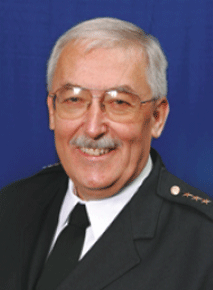
It was only about six months ago that many of us thought this moment was but a dream that might never be fulfilled. I know that it was through your courage, your prayers, and your efforts that we are able to share this year together. My own family and you, my IACP family, are people with immeasurable power and strength. I thank you for your strength, love, and prayers. I am humbled by the opportunity to serve as your president, and I am energized by the challenges and opportunities before us.
In the days, weeks, and months leading up to my swearing in, I was often asked what my agenda would be for the coming year. This is a difficult question, because although there are things that I would like to accomplish during my term in office, I believe that it is the membership that truly sets the agenda for the association. It is from listening and speaking to you—to our sections, committees, and divisions—that we, as the elected officers of the IACP, gain valuable direction and set the course for our association and our profession.
There are, however, a few areas of critical importance that I would like to address.
First, the United States has just elected a new president, and no matter what affiliation you may have, it is clear that the incoming administration will confront many challenges as it takes office. It is imperative that the IACP work diligently to develop a relationship with the new president, his staff, and Congress. Over the last eight years, the IACP and the law enforcement profession have suffered because of our lack of relationship to, and our voice not being heard in, the White House. This was not because we failed to try but rather because the door was not open to us. With your support, I am confident this will change.
I am pleased to say that the IACP’s International Policing Division continues to prosper, but there is much work ahead: this will be a big year for our international activities. We will be hosting regional conferences in Qatar, Estonia, and Taiwan, and next fall we will be holding the IACP’s Global Policing Summit in India. These conferences and summits are vital as we continue to develop relationships and encourage more non–North American law enforcement executives to join with us at the IACP. This growth is essential because it is clear that successfully confronting the challenge posed by transnational criminal and terrorist organizations requires that the international law enforcement community establish and maintain effective working relationships that allow us to pool our information and our resources.
I believe it is also critically important that we, as the leaders of the law enforcement profession, take aggressive action to protect our officers from harm. The IACP already has much to offer in the ways that we can reduce the physical dangers that our officers face on the job—through our training programs, SACOP’s SafeShield Project, or the Highway Safety Committees Law Enforcement Stops and Safety Subcommittee—but there is another area that is in critical need of attention: protecting the mental health of those with whom we work. According to some studies, police suicides are nearly double the rate of the civilian population. The devastation and the loss felt by their families, departments, and communities are immeasurable. So often the abuse of alcohol or drugs plays a role in these deaths, but this abuse alone impacts too many of our people. During the next year, we will look at these issues and find the best way to provide our members with information on dealing with drug and alcohol abuse and police suicides.
We need to ensure that we plan for the future of our profession by providing opportunities for leadership growth. The IACP has embraced this concept and has developed incredible programs focused on leadership development. The Center for Police Leadership and the Police Chief Mentoring Project offer programs and training courses that should be used as a basis for developing the next generation of police leadership.
Another outstanding example of the IACP’s commitment to continued professional development of our future police leaders is a new program established by the IACP Foundation and the Northwestern University Center for Public Safety. Northwestern has long been a partner with the IACP in the field of highway and traffic safety and has recently extended that partnership through the foundation’s scholarship series.
Finally, I want to address an issue that is close to my heart. This year marks the 25th anniversary of the commitment that the IACP made to the Torch Run for the Special Olympics. The IACP is the founding law enforcement organization of this event, and our members continue to support these efforts. It is through your work that Special Olympians have opportunities to develop physically, learn social skills, and develop self-confidence. You also help to provide awareness and understanding for the needs of this special part of our communities. I challenge you to participate. Go to an event and hang a medal around the neck of an athlete. It will touch your heart, and it will change you forever.
The year ahead is filled with challenges and opportunities. I am grateful for the trust you have placed in me, and I am thankful for your continuing support. For 115 years, the IACP has represented the best in policing, and I am confident that by working together, drawing on each other’s knowledge, experience, and commitment, we will maintain this wonderful tradition. ■


